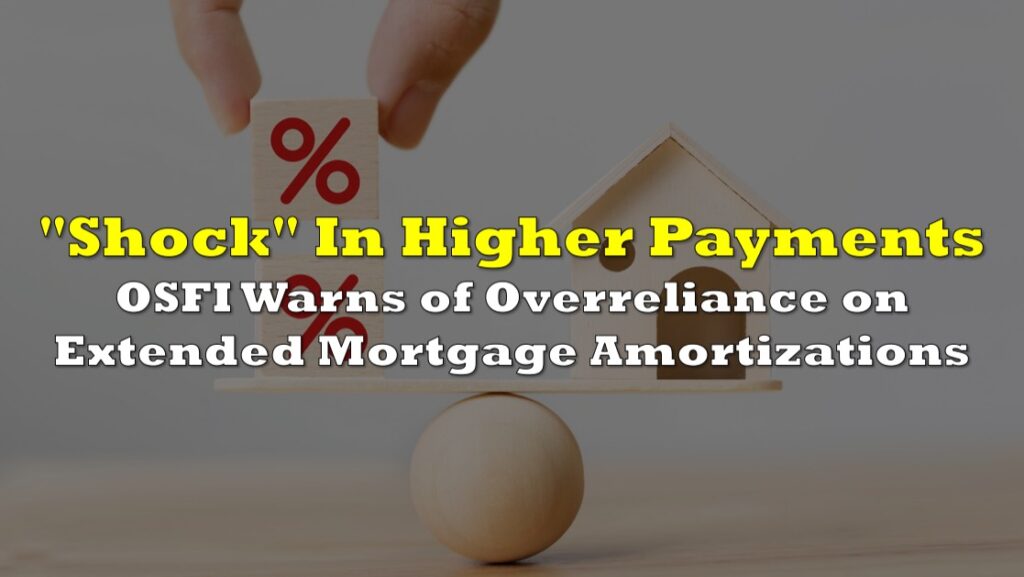Canadian consumers are feeling the pinch of rising interest rates, and Canada’s major banks are gearing up to face the challenges ahead.
As the country’s big six banks reported their quarterly financials, a trend appeared in which the firms’ mortgage loans are leaning towards very long-term amortization periods.
Worrisome Stats:
— Hanif Bayat (@HanifBayat) August 31, 2023
Big 6 Banks Residential Mortgages July 2023
Remaining Amortization>25 years
(% of all mortgages)
RBC: 43%
TD: 48%
BMO: 46%
CIBC: 47%
National Bank: 28%
Scotia: NA
Remaining Amortization>30 years
RBC: 24%
TD: 26%
BMO: 30%
CIBC: 27%
National Bank: 1%
Scotia: 1% pic.twitter.com/GRtAzabJDX
In recent bank earnings reports, it’s evident that the slowing economy is causing concerns for the country’s largest financial institutions. Many of them have reported declines in profits and increased provisions for potential loan losses during their third quarters.
While some banks express confidence in the risk levels associated with their mortgage portfolios, they acknowledge the growing pressure on consumers in a rising interest rate environment.
Dave McKay, the CEO of Royal Bank of Canada, pointed to the impact of higher interest rates and external factors like a slowdown in China, emphasizing their potential to cool Canada’s economy. He noted indicators of a slowing labor market, such as decreasing wage growth, fewer job postings, and rising Canadian unemployment, leading to a softer economic outlook.
Scott Thomson, CEO of Scotiabank, echoed the sentiment, indicating that the bank is setting aside more funds for potential loan defaults in response to signs of “recessionary conditions” in the economy.
Despite economists’ predictions of an economic slowdown due to higher debt costs and the potential for job losses, consumer spending has remained surprisingly robust in 2023. TD Bank’s latest consumer spending tracker reveals a decline in discretionary spending but sustained demand for services like travel and entertainment, acting as a “catalyst” for ongoing economic activity.
TD CFO Kelvin Tran emphasized the potential pressure on consumers due to higher interest rates but noted their resilience. However, the banks are closely monitoring the situation.
While the Bank of Canada has raised its benchmark interest rate by 4.75 percentage points over the past 20 months, some households with mortgages yet to renew have not felt the full impact of higher borrowing costs.
Pedro Antunes, chief economist at the Conference Board of Canada, explained that only a fraction of outstanding mortgages have renewed into the higher rate environment, suggesting that there is still significant financial strain ahead for many Canadians.
One group facing higher rates are those with variable-rate mortgages on fixed payment schedules. While variable mortgages fluctuate with the Bank of Canada’s policy rate, fixed payments result in adjustments to the loan’s amortization, potentially leading to higher regular or lump-sum payments when the “trigger rate” is reached.
Several of the Big Six banks, including RBC, TD Bank, CIBC, and BMO, reported that over 40% of their current mortgage portfolios have amortizations exceeding the typical 25-year mark. When these mortgages come up for renewal, borrowers could face increased payments as they revert to their original amortization period at current rates.
22.5% of all $CM mortgages – or $49.8 billion worth – are seeing payments only cover interest or less
— The Deep Dive (@TheDeepDive_ca) August 31, 2023
Some of these are literally endless mortgages under current terms.
How long can this go on before housing has its day? pic.twitter.com/KfF6Cu6IqL
It’s worth noting that variable-rate, fixed-payment mortgages gained popularity during the COVID-19 pandemic when low interest rates prompted many Canadians to enter the housing market. Scotiabank and National Bank of Canada do not offer these types of variable products to mortgage customers.
Amid these challenges, banks are working to support their clients through the transition. TD Bank, in particular, has the highest proportion of mortgages with amortizations over 25 years. While they’ve seen a decline in mortgages beyond 35 years as clients shift to fixed-rate products or increase their payments, they are prepared to assist clients facing difficulties.
Earlier this year in July, the Office of the Superintendent of Financial Institutions (OSFI) issued a cautionary statement highlighting the excessive reliance of both lenders and borrowers on extending mortgage amortization periods. According to Peter Routledge, the head of OSFI, individuals with mortgages that have insufficient payments to cover the interest portion of the loan could face a significant “shock” in the form of substantially higher payments in the coming years.
The Financial Consumer Agency of Canada has released guidelines for federally regulated financial institutions to ease the burden of mortgage renewals on vulnerable customers. These guidelines include extending mortgage amortizations for as short a period as possible and waiving some fees and penalties during the renewal process.
Information for this briefing was found via Global News and the sources mentioned. The author has no securities or affiliations related to this organization. Not a recommendation to buy or sell. Always do additional research and consult a professional before purchasing a security. The author holds no licenses.









